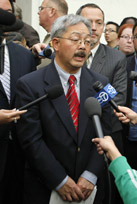June 10, 1968: The U.S. Supreme Court rules in Terry vs. Ohio that police may stop and search anyone they reasonably suspect to be armed and dangerous and about to commit a crime. It's the first in a series of rulings on the issue, including some finding that race alone could not constitute reasonable suspicion.
April 5, 1999: The New York City Police Department initiates a policy to more carefully record stop-and-frisk incidents. The policy coincides with a "broken windows" approach launched under then-Mayor Rudolph Giuliani: police aggressively prosecute offenders for small crimes in hopes of preventing big ones. The number of stop-and-frisk incidents soars.
May 16, 2012: U.S. District Court Judge Shira A. Scheindlin grants class action status to plaintiffs who say their civil rights have been violated because police selected them for frisking based on their race. The evidence for this discrimination is "overwhelming," she says.
June 27, 2012: San Francisco Mayor Ed Lee proposes a stop-and-frisk policy as a way of reducing violence in San Francisco. He says he had a "good conversation" with New York Mayor Michael Bloomberg on the tactic.
July 17, 2012: Faced with protests, Lee tries to clarify his comments. He issues a statement saying that he is not considering a policy that will violate anyone's constitutional rights and result in racial profiling, but he is "willing to move forward with bold ideas that get to results."
July 23, 2012: Lee says in light of the July 20 Colorado massacre he is "more committed" to an unspecified police tactic that would get guns off the city's streets.
To shed further light on the controversy, KQED Forum host Michael Krasny asked San Francisco Supervisor Malia Cohen to explain her opposition to the policy. She offered some statistics:
In 2011... 685,724 stops were conducted... Eighty-eight percent of those person’s stopped were totally innocent. Fifty-three percent were African American, 34 percent were Latino, only 9 percent were white.
He also spoke to Alisa Chang, a reporter at WNYC in New York and a former KQED intern. She amplified on those stats:
So that means that if you are young and black and male and living in New York City, particularly in an outer borough, it’s more likely you are going to be stopped once during your life....
It is very important not to equate stop and frisk to racial profiling. Even the staunchest opponents to stop and frisk are not saying, "Let’s get rid of every single stop and frisk in the city." There is a theory that you can do stop and frisks legally and not through racial profiling...
The vast majority of the crime decline that has happened in the city since the late 80s and early 90s happened before Bloomberg ever took office, before stop and frisk policy went to the staggering levels that we see today.
Krasny got a perspective from Dennis Smith, a New York University public policy professor and consultant to the New York Police Department on stop-and-frisk.
Citizens, while they appreciate [that] the person who has victimized them is subsequently arrested, prosecuted or even punished, on a whole they wouldn’t want to be victimized at all. And they would like the police to play a role in seeing that they are not victims. So the transformation [is] to say we are not going to wait until crime occurs.
